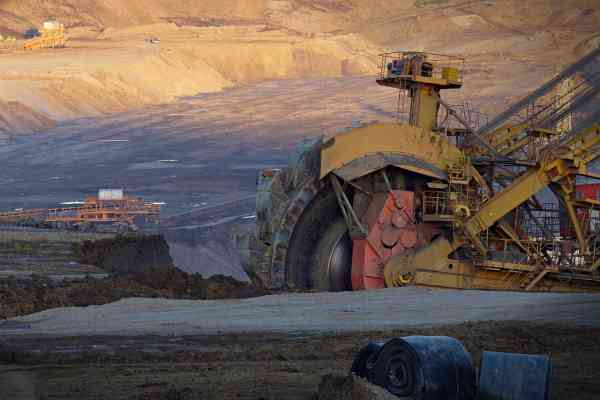April 24th, 2025 | 07:30 CEST
Germany Inc. as the last hope? Volkswagen, Bayer, Globex Mining
Germany's economy is facing its third consecutive year of contraction. The automotive industry is struggling with competition from China, and Bayer is grappling with past acquisitions, looming tariffs, and other challenges. Now, Bayer shareholders are even being asked to inject new capital. Is the German industry working with politicians to find long-term solutions? Not a chance! The days of Germany Inc. seem to be over. We look at how investors can seize opportunities in this complex situation.
time to read: 3 minutes
|
Author:
Nico Popp
ISIN:
VOLKSWAGEN AG VZO O.N. | DE0007664039 , BAYER AG NA O.N. | DE000BAY0017 , GLOBEX MINING ENTPRS INC. | CA3799005093
Table of contents:

"[...] The transaction offers benefits to all parties: Shareholders now have three promising projects in their portfolio. [...]" Bradley Rourke, President, CEO and Director, Scottie Resources Corp.
Author
Nico Popp
At home in Southern Germany, the passionate stock exchange expert has been accompanying the capital markets for about twenty years. With a soft spot for smaller companies, he is constantly on the lookout for exciting investment stories.
Tag cloud
Shares cloud
Germany Inc.: A proven concept for prosperity for all
Little remains of the once proud Germany Inc. Between the 1970s and 1990s, German banks pulled the strings together with industry. There were cross-shareholdings between companies, and people from different sectors met on supervisory boards. In 1988, representatives of Deutsche Bank alone sat on 400 supervisory boards. Alongside Alfred Herrhausen, Hermann Josef Abs was particularly prominent in this context, serving on over twenty supervisory boards. Abs was even responsible for introducing an upper limit on mandates. Although Germany Inc. had to live with accusations of collusion even back then, this form of cooperation ensured long-term strategies and shielded German industry from foreign influence.
Even though the former Germany Inc. has not existed since the beginning of globalization and the focus on shareholder value in the late 1990s, the question must be asked whether closer cooperation between German companies - possibly under political leadership - would not be appropriate again at this point. The German automotive industry is struggling with dwindling margins and declining market share in Asia. The energy transition is necessitating a profound transformation. The security transition requires investment and the repurposing of former industrial plants. Skilled workers are currently tied to ailing industries and would be more productive elsewhere.
Supply of raw materials critical for Germany
While companies like Volkswagen are bucking the trend and adopting the "China speed" they acquired in the Far East to develop new models and strategies, companies are still largely fighting their battles alone. Mercedes-Benz, BMW, Porsche, and Volkswagen remain more rivals than companions in adversity. Shareholders are now also being called upon to resolve the crisis at Bayer - which is still suffering from the overpriced Monsanto takeover and the glyphosate scandal - and to inject new capital. Given the challenges ahead, the future German government's plans for lower energy costs should only be seen as a starting point. Further steps are necessary. However, a form of state capitalism in which the federal government protects markets and creates reliable framework conditions for entire supply chains is still a long way off.
For many years, one of the weak points of German industry has been the supply of raw materials. Since metal mining in Europe is challenging due to strict regulations and comprehensive protection of individual rights, German companies must import raw materials. However, since Donald Trump took office, the world has been divided into several camps – and Europe appears to hold the worst cards in this competitive situation. This is reason enough to get involved in promising projects at an early stage.
Globex Mining bundles 250 raw material projects
The raw materials conglomerate Globex Mining is unique in its approach. Instead of carrying out extensive exploration work itself, the Company acquires promising properties, develops them to a certain point, and then grants options or license agreements to other companies. These partners then carry out further exploration or development, while Globex benefits from royalties and equity stakes. Globex Mining has around 250 projects in its portfolio, including properties with a focus on gold and silver, but also copper, zinc, nickel, cobalt, lithium, vanadium, and rare earths.
As Globex Mining invests exclusively in North America, the Company offers unparalleled access to mineral resources in secure jurisdictions. Synergies between companies in the Globex network are also conceivable – very much in the style of the former Germany Inc. Since last October, Globex Mining's share price has already gained around 50%. Stocks such as Volkswagen (+1.2%) and Bayer (-14.3%) cannot keep pace. Globex Mining shares are particularly interesting for investors who want to participate in promising raw material projects at an early stage and, at the same time, value a high degree of diversification.
Conflict of interest
Pursuant to §85 of the German Securities Trading Act (WpHG), we point out that Apaton Finance GmbH as well as partners, authors or employees of Apaton Finance GmbH (hereinafter referred to as "Relevant Persons") may hold shares or other financial instruments of the aforementioned companies in the future or may bet on rising or falling prices and thus a conflict of interest may arise in the future. The Relevant Persons reserve the right to buy or sell shares or other financial instruments of the Company at any time (hereinafter each a "Transaction"). Transactions may, under certain circumstances, influence the respective price of the shares or other financial instruments of the Company.
In addition, Apaton Finance GmbH is active in the context of the preparation and publication of the reporting in paid contractual relationships.
For this reason, there is a concrete conflict of interest.
The above information on existing conflicts of interest applies to all types and forms of publication used by Apaton Finance GmbH for publications on companies.
Risk notice
Apaton Finance GmbH offers editors, agencies and companies the opportunity to publish commentaries, interviews, summaries, news and the like on news.financial. These contents are exclusively for the information of the readers and do not represent any call to action or recommendations, neither explicitly nor implicitly they are to be understood as an assurance of possible price developments. The contents do not replace individual expert investment advice and do not constitute an offer to sell the discussed share(s) or other financial instruments, nor an invitation to buy or sell such.
The content is expressly not a financial analysis, but a journalistic or advertising text. Readers or users who make investment decisions or carry out transactions on the basis of the information provided here do so entirely at their own risk. No contractual relationship is established between Apaton Finance GmbH and its readers or the users of its offers, as our information only refers to the company and not to the investment decision of the reader or user.
The acquisition of financial instruments involves high risks, which can lead to the total loss of the invested capital. The information published by Apaton Finance GmbH and its authors is based on careful research. Nevertheless, no liability is assumed for financial losses or a content-related guarantee for the topicality, correctness, appropriateness and completeness of the content provided here. Please also note our Terms of use.




